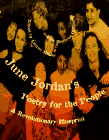JUNE JORDAN Poet, Essayist and Critic |
|  |

JUNE JORDAN Poet, Essayist and Critic |
|  |
      | June Jordan, the most published African American writer in history, is the author of more than twenty-five major works, including ten collections of poetry, five books of essays, two plays, a novel and eight children's books. Her most recent publication is Soldier: A Poet's Childhood (May 2000), a vivid and moving childhood memoir of the Harlem and Brooklyn neighborhoods where she lived. Toni Morrison praised the book as "an intensely perceptive narrative," and Ntozake Shange commented that June Jordan "has once again found a way to make the impossible brutality of living a song."
Jordan's writings explore topics ranging from individual concerns like love and self-awareness to broader social issues raised by conflicts in Nicaragua, Africa, the Balkans and elsewhere. Yet what emerges most clearly in her works is an unsparing focus on African-American life in the United States, including the mixed varieties of experiences that are clearly tied up in it.
Jordan's books of poetry include the collections Kissing God Goodbye: Poems, 1991-1997 (1997), Haruko/Love Poems (1994), Naming Our Destiny (1989), Living Room: New Poems 1980-1984 (1985), and Things That I Do in the Dark (Beacon Press, 1981). Her essay collections include Affirmative Acts: Political Essays (1998), June Jordan's Poetry for the People: A Revolutionary Blueprint (1995), Technical Difficulties (1992), and Civil Wars: Selected Essays 1963-1980 (1980). Jordan also wrote the libretto for I Was Looking at the Ceiling and Then I Saw the Sky (Scribner, 1995), an opera with music by John Adams.
Social commitment and conscientious activism have merged in June Jordan's works to produce a powerful literature of revolutionary possibility. As poet Marilyn Hacker has observed: "Anyone who doubts the relevance and timelessness of poetry ought to read Jordan. . .[she] epitomizes a particular kind and strength of American poetry: that of the politically engaged poet whose commitment is as seemlessly joined to her work as it is to her life." Yet this political commitment is more than matched by rare gifts for language and expression. "June Jordan is one of the most musically and lyrically gifted poets of the late twentieth century," comments Adrienne Rich. "Her poems are extraordinarily tonal, sensuous, capturing moments or ways of being which make love--in many dimensions--more possible, more revolution-directed.
Like many of her earlier works, Jordan's most recent collection of poems, Kissing God Goodbye, bears witness to the pain, confusion, and passion that come with living in our society at the twilight of the twentieth century. Beautiful love poems are interspersed with poems about Bosnia, Africa, urban America, Clarence Thomas, affirmative action, her mother's suicide, and Jordan's bout with breast cancer. Jordan's many selves--as poet, essayist, feminist, educator and activist--merge in this volume, which is alternately lyrical, magical, startlingly spare and unapologetically political. Yet its message and its appeal remain somehow universal.
In her recent collection of essays, Affirmative Acts, Jordan's vision is similarly penetrating. In a voice that is as caustic at times as it is eloquent, Jordan attempts to uncover the social, economic, racial, and political conflicts that mar human experience. Exploring the confusion of an America in the grip of pseudo-multiculturalism and political intolerance, Affirmative Acts continues in the tradition of her insightful collections Civil Wars and Technical Difficulties. Jordan acquaints readers with moments of American life threatened by social negligence and economic despair, demonstrating how all-too-frequent bouts of civil unrest bring out the worst and weakest sides of the American spirit. At the same time, she challenges readers to recognize and seize the possibilities for meaningful change in the approaching millennium.
June Jordan's many honors include a Rockefeller Foundation grant, the Lila Wallace-Reader's Digest Writer's Award, the Women Who Dared Award of the National Black Women's Health Project, the PEN Center USA West Freedom to Write Award, and the National Association of Black Journalists Award. She is also the recipient of fellowships from the National Endowment for the Arts, the New York Foundation of the Arts and the Massachusetts Council on the Arts. Jordan serves on the board of directors for the Center for Constitutional Rights and is currently Professor of African American Studies at the University of California, Berkeley. June Jordan was a visiting guest at the NYS Writers Institute on April 27, 2000. |
"June Jordan is as courageous, as rebellious, as compassionate, as she is original. . .an inhabitant of the entire universe." - Alice Walker
 | LIVE! AT THE LIBRARY is an initiative of the American Library Association, with major support from the Lila Wallace-Reader's Digest Fund and additional support from the National Endowment for the Arts |